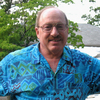Paul Fleisher

Paul Fleisher has spent his working life as an educator and writer. His books for young people cover a variety of science, ecology and natural history subjects. He has also written several widely-used classroom activity books on thinking games, social activism, and creative writing.
Paul currently works as an adjunct professor in the school of education at Virginia Commonwealth University, as well as assistant to the director of the Richmond Peace Education Center. He also teaches classes in writing at the University of Richmond. Prior to taking early retirement in 2005, he taught gifted elementary and middle school students in the Richmond, Virginia Public Schools for almost 30 years. During that time, he helped develop numerous interdisciplinary instructional units on topics including Humor, Justice, Engineering and Design and The Art and Science of Music. Paul was in the vanguard of teaching educational technology in Richmond Public Schools, teaching computer programming and web design to his students. He has offered workshops on team-building, thinking games, teaching writing, and other topics at educational conferences for many years.
Paul remains an activist for peace and social justice. He currently serves on the boards of the Virginia Forum and the Virginia Museum of Natural History. He has also served terms on the Virginia Education Association’s Fitz Turner Commission for Human and Civil Rights, and the Virginia Chapter of the ACLU. In 1988 Paul received the Virginia Education Association Award for Peace and International Relations and in 1999 he was awarded the Thomas Jefferson Medal for Outstanding Contributions to Natural Science Education.
It is Paul’s great good fortune to be married to educator Debra Sims Fleisher, who has taught him much of what he knows about working in a classroom, as well as how to live as a more decent human being. In his spare time Paul is an avid gardener, cook, and reader.
Interview
What was your favorite book when you were a child?
- I read constantly as a child—and I still do. It’s very difficult to choose a favorite book. I remember reading Winnie the Pooh many times over. When I was a little older, I read a lot of books, both fiction and non-fiction, by Isaac Asimov. As a teenager, I loved the Lord of the Rings by J. R. R. Tolkein.
What’s your favorite line from a book?
- Again, there are many. One of my favorite passages is from The Fellowship of the Ring by J. R. R. Tolkein—in which Gandalf stands on the bridge at Khazad-Dhum and battles the Balrog, deep in the mines of Moria.
Who are your top three favorite authors or illustrators?
Again, it’s difficult to choose. Perhaps Mark Twain, John McPhee, and Edward O. Wilson.
Why did you want to become an author or illustrator?
- It wasn’t so much "wanting" to become an author. In school, writing was something I liked to do—maybe even had to do. In college I had an assignment to write a children’s book for a children’s literature class, and that started me thinking about the possibility of writing as a second career. Early in my career, I wrote humorous essays – but I soon discovered there’s a very limited market for them. (Maybe I just wasn’t that funny.) Later I realized there were other ideas I wanted to share with readers, so I started writing about classroom techniques, nature study, and other topics that interested me and that I had some expertise in. Eventually, I got the nerve to try writing entire books. Much of my early writing began with activities and instructional units I created for the students in my own classroom. Several of my books include activities students themselves created as part of those units.
Do you have any advice for future authors or illustrators?
- You can’t just wait for inspiration to strike. Write. Just like anything else, you get better with practice.Writing also gives you a great opportunity to exercise your curiosity. Being a writer gives you a good excuse to ask anybody about almost anything you’d like to learn more about. Perhaps the most fun thing about being a writer for me is leaning about new subjects and new ideas as I research and write.









